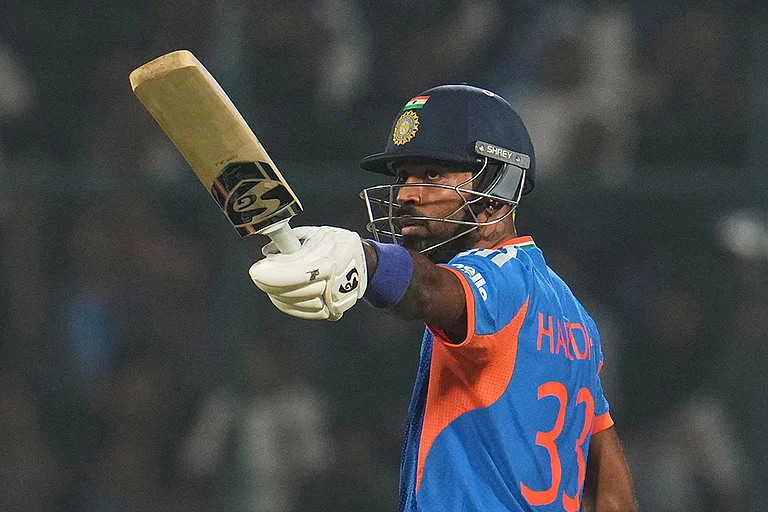Bangladesh Prime Minister Sheikh Hasina has sent 600 kg of mangoes as a gift to West Bengal Chief Minister Mamata Banerjee, officials said Monday.
"Mangoes comprising the ‘Himsagar' and ‘Langra' variants have been sent to Banerjee, as part of diplomatic efforts. Last year, too, we had sent mangoes," an official in the Bangladesh Deputy High Commission said, as per PTI report.
Hasina has also sent mangoes to all the chief ministers of the northeast.
Last year, she had sent mangoes as a gift to Prime Minister Narendra Modi and the chief ministers of West Bengal, Tripura and Assam.
India Bangladesh ties:
India played an important role in Bangladesh’s liberation movement. Diplomatic relations between the two countries formally began in 1971 with India's recognition of an independent Bangladesh, which was formerly known as East Pakistan.
When the Bangladesh Liberation War broke out between East Pakistan and West Pakistan (present-day Pakistan), India intervened in support of East Pakistan and helped secure its independence from Pakistan as the country of Bangladesh.
Throughout the Bangladesh Liberation War, India under the leadership of Prime Minister India Gandhi lent economic, military as well diplomatic support to the Bengali nationalists. Millions of Bengali refugees poured into India at the time and even more were internally displaced.
However, it was only after December 3 when the Pakistani Air Force carried out preemptive strikes on eleven Indian Air Force bases that India formally joined the Bangladesh War.
According to Lailufar Yasmin, Professor, Department of International Relations, University of Dhaka, India's support for the Bangladeshi liberation war and its treatment of the millions of Bangladeshi refugees pouring into India, reflected the Gandhian and Nehruvian philosophies that dictated the country to take an overwhelming international role for fighting for those who could not do it for themselves.
The religious rifts of the 70s
Despite a warm start, relations between the Hindu and Muslim majority nations somewhat soured in later decades due to religious fissures that arose in the mid-70s when Bangladesh developed closer ties with other Islamic nations. The period saw an increased emphasis on religious identity in Bangladesh and a spike in incidents of violence against Hindu minorities. There was also a push to promote religious identity over the country’s shared ethnolinguistic identity with India. India also did not take well to Bangladesh’s participation in the Organization of the Islamic Conference.
Cold War era
Bangladesh and India were also at loggerheads when it came to Cole war allegiances. Since its liberation at the height of the Cold War, Bangladesh had been close with the USSR and the two nations formally established their relations in 1972 itself. The nation, which continues to have diplomatic and trade relations with Russia, gave ostensible support to Communist USSR with Sheikh Mujibur Rehman even crediting the Soviet block for their role in Bangladesh’s liberation.
India, on the other hand, supported a policy of strict non-alignment during the Cold War, despite inclinations toward Russia. The difference in allegiances led to further tensions between India and Bangladesh.
Bangladesh-India now: Growing trade ties
It was trade, however, that finally melted the ice between the two nations with the onset of economic liberalisation in South Asia in the late 80s necessitating the need for increased bilateral trade and engagement.
South-Asian neighbours Bangladesh and India are common members of SAARC, BIMSTEC, IORA and the Commonwealth and share several cultural similarities, especially with the Bengali-speaking state of West Bengal.
The “special relationship” was strengthened in June 2015 when the countries resolved decades-old border disputes by signing the historic land boundary agreement.
Bangladesh is an important partner for India under its "Neighbourhood First" policy and the cooperation extends to areas of security, trade, commerce, energy, connectivity, science and technology, defence and maritime affairs, among others. It is now India's biggest trade partner in South Asia and the bilateral trade has grown from USD 9 billion to USD 18 billion in the last five years. Bangladesh has become the fourth largest export destination for India with the exports registering a growth of over 66 per cent from USD 9.69 billion in 2020-21 to USD 16.15 billion in 2021-22.
The country is also India's largest development partner with nearly one-fourth of New Delhi's commitment under the Line of Credit being made to it. The total number of contracts between the two nations has crossed the milestone figure of USD 2 billion.


























